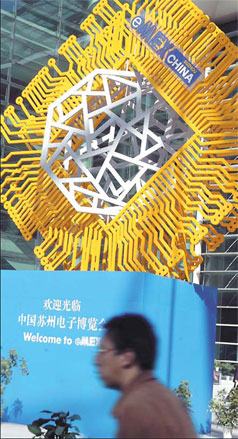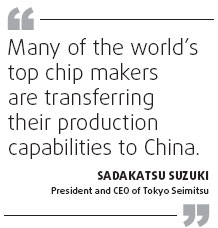

As a city on the lower reaches of the Yangtze River and on the shores of Lake Taihu in East China's Jiangsu province, Suzhou is renowned for its beautiful stone bridges, pagodas, and meticulously designed gardens that symbolize its status as a notable tourist attraction.
More recently, however, the city has made itself known in China's hi-tech industry by successfully attracting chip makers and IC (integrated circuit) designers from home and abroad, ranking it with cities such as Dalian and Shenyang that are famous for their IT industries.
Last month, Japan's Elpida Memory Inc, one of the world's biggest computer memory chip manufacturers, said it would jointly invest $5 billion with two Chinese investors to build a chip factory in Suzhou. The plant will have a capacity to produce the equivalent of 80,000 300mm wafers a month.

Yukio Sakamoto, president and CEO of Elpida, tells the local media he believes it is critical to invest in the rapidly growing China market to better serve their customers. He says the joint venture is an opportunity for Elpida to strengthen its production and marketing profile in China and the entire Asian market.
Elpida is not the first chip maker in Suzhou. In recent years, companies such as Advanced Micro Devices (AMD), Samsung Electronics Co and Matsushita Electric Industrial have all established their chip plants or assembly and test factories in the city.
That has helped to create an ecosystem for Suzhou's IC industry and attracted companies specializing in IC designing, chip manufacturing and CPU assembly and testing to the city.
According to reports from People's Daily, the turnover of the hi-tech industry in Suzhou Industrial Park, the city's major industrial base, reached 124.1 billion yuan last year, an increase of 30 percent over 2006. Suzhou's IC industry last year accounted for 16 percent of China's whole IC industry in terms of market turnover.
"Many of the world's top chip makers are transferring their production capabilities to China," said Sadakatsu Suzuki, president and CEO of Tokyo Seimitsu, a Japanese semiconductor vendor, on the sidelines of an industry forum held in Suzhou earlier last month. "As more and more Japanese semiconductor companies are expanding in the country, we will also increase our presence here in the future."
Although a heavy capital investment is needed, IC industry has a high ratio of ROI (return of investment). The industry is also noted for its low environmental impact and the ability to attract groups of complementary companies that provide raw materials, designs and assembly and test services to the chip makers, which also creates additional job opportunities for the local community.
That has made many Chinese local governments eager to attract companies such as Intel and AMD to boost local economies. According to earlier reports, the Dalian municipal government has given a significant subsidy and tax reductions to Intel for an exchange for having the world's largest chip maker put its plant in the city. Southwest China's Chongqing municipality is also striving to make itself one of China's largest semiconductor bases by releasing regulations that favor IC design and manufacture companies.
However, experts say Suzhou has its own advantages in developing IC industries because it is nearby Shanghai, one of China's largest port cities and economic engines, and has ample human resources. The municipal government has also established a favorable investment environment for overseas IC companies and domestic start-ups.

According to the China Semiconductor Industry Association (CSIA), shipments of China's IC Industry reached 20.21 billion by the first half of this year, an increase of 6.2 percent over the same period of 2006. The market turnover grew 10.4 percent to 65.6 billion yuan.
However, Xu Xiaotian, general secretary of China Semiconductor Industry Association, says although the shipments of Chinese IC companies are still on the rise, their revenues and profits are being reduced.
He says the growth rate of China's semiconductor market has slowed since 2005 due to shrinking outsourcing orders from overseas electronics manufacturing and design companies. The economic uncertainties in the global market since last year have made the situation even worse.
Wang Qinsheng, general director of CSIA IC Design Branch, says the driving force of the world's IC industry has transformed from computer vendors to the manufacturing of consumer digital products such as MP3 music players, portable hard disks, and digital cameras, which are all more fashion-oriented. The shift has made many IC designers and manufacturers more vulnerable to the market changes.
He says the IC companies should increasingly cooperate with each other to fight the market turbulence.
(China Daily 10/06/2008 page10)













